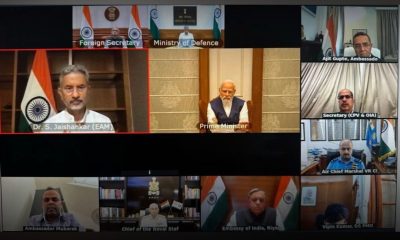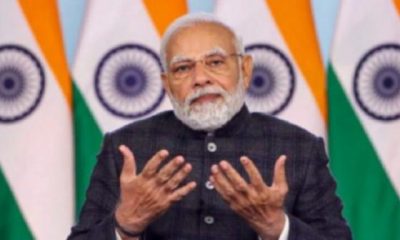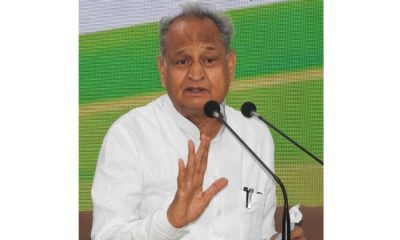Politics
Modi meets industry leaders in Japan, invites them to invest in India

Visiting Prime Minister Narendra Modi, who arrived in Tokyo on Monday on a two-day visit, met three important business leaders of Japan and invited them to invest in India.
Shortly after his arrival, Modi first met Nobuhiro Endo, the Chairman of NEC Corporation.
The Prime Minister lauded the NEC’s role in India’s telecommunication sector, especially in undertaking Chennai-Andaman & Nicobar Islands (CANI) and Kochi-Lakshadweep Islands (KLI) OFC projects. He also highlighted India’s investment opportunities under the Production Linked Incentive (PLI) scheme.
During the meeting, they discussed various reforms being undertaken to enable ease of doing business in India including in industrial development, taxation and labour. They also discussed opportunities in India in new and emerging technologies.
According to the Prime Minister’s Office (PMO), Endo spoke about opportunities in India in areas such as smart cities, emerging technologies and an innovative effort to encourage learning of Japanese in India.
Modi also met Osamu Suzuki, senior advisor of the Suzuki Motor Corporation, and discussed further investment opportunities in India including setting up of production facilities for electric vehicles and batteries as well recycling centres, for realizing the goal of sustainable growth.
They also discussed strategies for building the local innovation system in India, including skill development through Japan-India Institutes of Manufacturing (JIM) and Japanese Endowed Courses (JEC).
Recalling Suzuki’s association and contribution in India, Modi appreciated the transformational role of Suzuki Motors in the automotive industry of India.
He also appreciated that Suzuki Motor Gujarat Pvt Ltd. and Maruti Suzuki India Ltd were among the applicants approved under Production Linked Incentives (PLI) scheme in automobile and auto component sector.
According to the officials in PMO, after meeting Modi, Suzuki said: “Reforms undertaken by PM Modi are indescribable and these reforms are changing India into a ‘Model Landscape’ while the self reliance (Aatmanirbhar) theme is supported by the Japanese’s investors very strongly.”
Modi also held two other meetings with Tadashi Yanai, Chairman, President and CEO of Uniqlo, a Japanese casual wear designer, manufacturer and retailer; and Founder of SoftBank Group Masayoshi Son.
During their meeting, Yanai appreciated the entrepreneurial zeal of the people of India and said: “We can focus on end to end products i.e. from plant to design to fabric. We want to make growth in India. IT talent in India is excellent… I just want to say, ‘Let’s Do it’.”
On his part, Modi asked Yanai to take part in the PM-Mitra scheme aimed at further strengthening the textiles sector. said the PMO.
Meanwhile, the Prime Minister and the Softbank Group founder discussed subjects like India’s strides in the world of StartUps, opportunities in research, technology and ways to boost investment linkages.
Modi arrived here on a two-day visit at the invitation of his Japanese counterpart Fumio Kishida.
He is scheduled to participate in the third Quad Leaders’ Summit in Tokyo on Tuesday along with US President Joe Biden, Australian Prime Minister Anthony Albanese and Kishida.
Modi and Kishida will also hold a bilateral meeting.
National News
Cyclone Montha Effect On Mumbai: Thunderstorms, Gusty Winds Lash City & Coastal Maharashtra
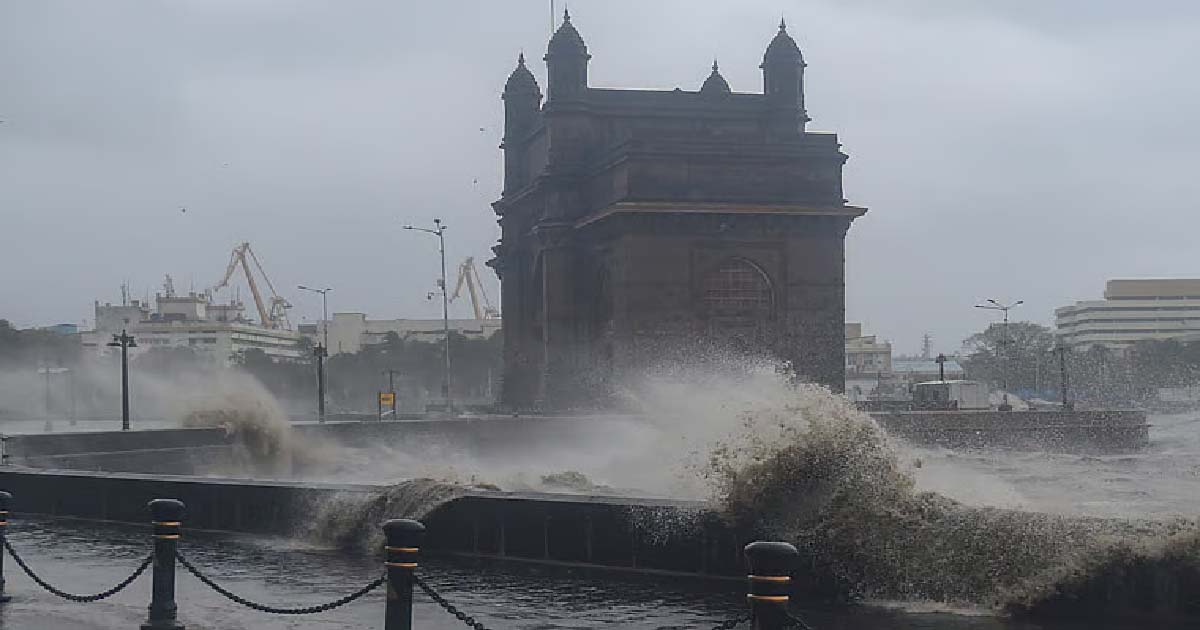
Under the influence of severe cyclonic storm “Montha”, which is over Bay of Bengal, the western costal regions including Mumbai have been witnessing change in weather conditions from last couple of days. The parts of the island city and its metropolitan regions continued witnessing thunderstorms and gusty winds on Tuesday.
The India Meteorological Department (IMD) in the evening issues a weather warning for rain spells with gusty winds gusty winds reaching at the speed of 40-50 kmph for the districts of Mumbai, Thane and Palghar. The region experienced similar weather on Monday evening too. The state is likely to witness similar weather conditions for the entire week.
The IMD has issued a Yellow Alert for thunderstorm accompanied with lightning, light to moderate rainfall & gusty winds (30- 40kmph) at isolated places for Maharashtra upto October 30. However, the unseasonal rainfall conditions will continue till November 1.
The IMD Mumbai’s state on Tuesday morning said, “The Severe Cyclonic Storm “Montha” over westcentral Bay of Bengal moved north-northwestwards with a speed of 12 kmph during past 6 hours. A through now runs from the upper air cyclonic circulation associated with the depression over eastcentral Arabian sea.”
As per local weather forecast for Mumbai city and suburbs for the next 48 hours, the skies will be generally cloudy with possibility of thunderstorms accompanied with light to moderate rainfall and gusty winds. The maximum and minimum temperatures will be around 33 deg. C. and 25 deg. C.
The weather department of October 26 had issued a weather warning saying, “Under the influence of upper air cyclonic circulation, thunderstorms accompanied with lightning & gusty wind speed reaching 40-50 kmph are very likely to occur over parts of Maharashtra between 26-30 October. Fairly Widespread to Widespread moderate rainfall activity with Heavy rainfall at isolated places is expected over Konkan and Madhya Maharashtra during the above period. Isolated to scattered light/moderate rainfall accompanied with thunderstorms is expected over Marathwada, during 26 -29 October.” The fishermen are advised not to venture into sea. ‘
Cyclone Montha is a new cyclonic storm formed over the Arabian Sea and was expected to reach Andra Pradesh on October 28.
The weather department has warned that low pressure area has formed over the Bay of Bengal, and the depression is likely to gain strength over the next few days, thereby affecting the weather conditions in several states.
The cyclones in the North Indian Ocean region are given names from a predetermined list submitted by countries in the region. The name Montha was suggested by Thailand, which means fragrant flower or beautiful flower in the Thai language.
Crime
K’taka CM urges police to join him in his mission to make state drug-free
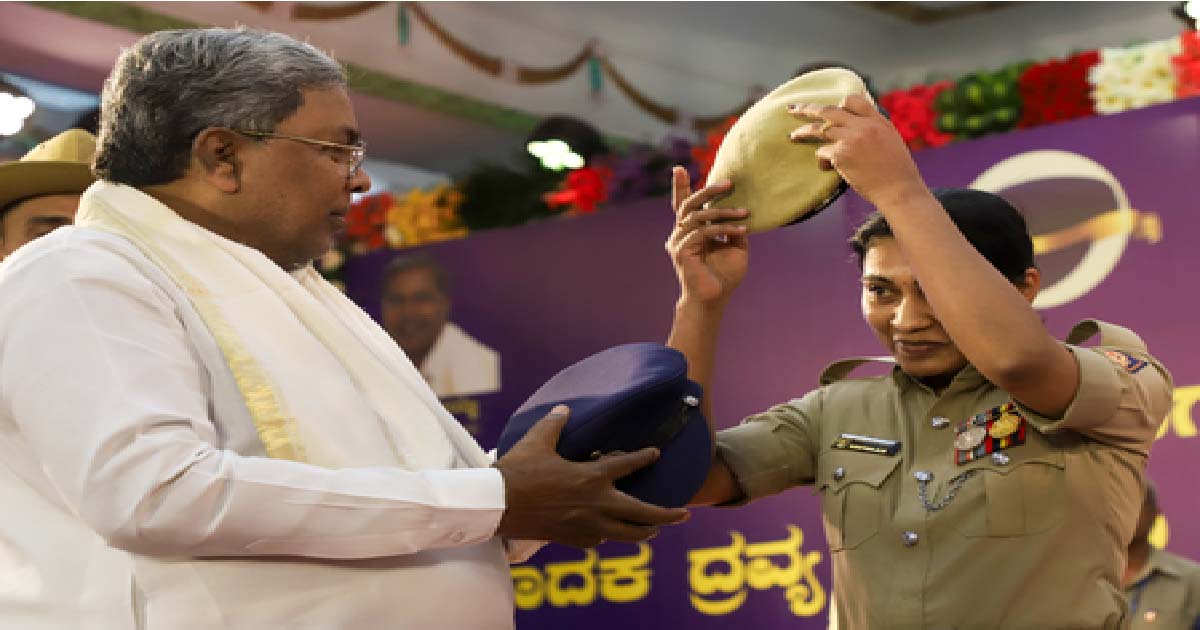
Bengaluru, Oct 28: Karnataka Chief Minister Siddaramaiah on Tuesday called upon the state police to join him in the mission to make Karnataka a “drugs-free state”, urging officers to take strong and coordinated action against the menace.
“My goal is to make Karnataka drugs-free, and I urge you to make it your goal as well. If we achieve this, the people of Karnataka will express their gratitude to the police department,” the Chief Minister said.
He was speaking after distributing new peak caps to police personnel, inaugurating the Anti-Narcotics Task Force, and releasing the ‘Sanmitra’ action plan handbook at an event organised by the Karnataka State Police Department at the Vidhana Soudha Banquet Hall in Bengaluru.
“Our youth, students, and young generation should not fall prey to drugs. The police department must take a firm and committed stand against this menace,” he said.
“In Mangaluru district, there were frequent communal clashes and instances of misconduct by police personnel earlier. The officers in charge at the time failed to maintain control, so I ordered the transfer of two officials. Now, Mangaluru district is under control. This achievement too belongs to our own officers and staff — they are not from another world; they are ours. Therefore, if you resolve to do it, everything is possible. Prove it through your work,” the Chief Minister urged.
“In the same way, it is possible for you to curb the menace of drugs across the entire state. If you succeed, the prestige of the Karnataka Police will rise to international standards,” he added.
“Some police personnel are involved with real estate operators and drug networks. It is within your power to nip rowdy elements in the bud. The fear of the police has diminished in the criminal world. Ask yourselves why this has happened — you know the answer,” Siddaramaiah said, appealing to the conscience of police officers and staff.
“You know who sells drugs, who brings them in, and who the agents in this network are. Make Karnataka a ‘Drugs-Free State’ at the earliest. Achieve it and show results,” he urged.
“The design of the peak cap released today was chosen by me personally. We have replaced the model that was in use since 1956 –nearly 70 years. Now, both officers and personnel will have a uniform cap design. I hope this change will boost your confidence,” the Chief Minister said.
“It’s not just the cap that should change — your performance should also improve,” he added.
The Chief Minister lauded the police department’s efficiency, saying, “The government earns a good name because of the police department’s dedication. The India Justice Report ranking Karnataka Police as number one in the country has enhanced the state’s prestige.”
Crime
Bengal assault case: Daughter of arrested BJP leader files counter complaint claiming molestation

Kolkata, Oct 28: After BJP leader Rakesh Singh and his children were arrested in connection with an assault case in West Bengal, his minor daughter on Tuesday filed a counter-complaint of molestation against the son of the flat owner, on whose complaint her father was held.
The police said flat owner Chandu Khan’s son has been arrested, based on a complaint lodged by the BJP leader’s daughter.
Kasba Police said that all the arrested will be produced in court later in the day, where police custody of the accused will be sought.
According to sources, the police are investigating whether Rakesh Singh’s minor daughter also had any role in the incident on Monday.
“We have received a counter-complaint today. The BJP leader’s daughter has made the complaint. The accused has been arrested on charges of molestation. We are investigating both incidents. Separate cases have been registered. Investigation is on,” said a senior officer of Kolkata Police.
Kolkata Police arrested Rakesh Singh and his son on charges of going on a rampage inside a housing complex in the Kasba area of Kolkata on Monday.
The police had also detained the minor daughter of the BJP leader over the same charge.
According to flat owner Chandu Khan’s son Rajarshi Khan, “Rakesh Singh has a flat on the fourth floor. He has forcibly occupied our flat on the third floor. He has kept his belongings there. I have repeatedly asked him to remove the belongings. But, he did not remove them. We were taking the workers today and putting their belongings down because we were paying rent. Then eight to nine people came and beat my father and brother. They had firearms in their hands. They beat them with gun butts. My father had to be admitted to the hospital. They also attacked me with a knife.”
However, the daughter has now filed a molestation case against the son of the flat owner.
In September, Rakesh Singh was arrested for vandalism at the West Bengal Pradesh Congress Committee (WBPCC) office in central Kolkata. Later, he was released on bail.
-

 Crime3 years ago
Crime3 years agoClass 10 student jumps to death in Jaipur
-

 Maharashtra1 year ago
Maharashtra1 year agoMumbai Local Train Update: Central Railway’s New Timetable Comes Into Effect; Check Full List Of Revised Timings & Stations
-

 Maharashtra1 year ago
Maharashtra1 year agoMumbai To Go Toll-Free Tonight! Maharashtra Govt Announces Complete Toll Waiver For Light Motor Vehicles At All 5 Entry Points Of City
-

 Maharashtra1 year ago
Maharashtra1 year agoFalse photo of Imtiaz Jaleel’s rally, exposing the fooling conspiracy
-

 National News1 year ago
National News1 year agoMinistry of Railways rolls out Special Drive 4.0 with focus on digitisation, cleanliness, inclusiveness and grievance redressal
-

 Maharashtra12 months ago
Maharashtra12 months agoMaharashtra Elections 2024: Mumbai Metro & BEST Services Extended Till Midnight On Voting Day
-

 National News1 year ago
National News1 year agoJ&K: 4 Jawans Killed, 28 Injured After Bus Carrying BSF Personnel For Poll Duty Falls Into Gorge In Budgam; Terrifying Visuals Surface
-

 Crime1 year ago
Crime1 year agoBaba Siddique Murder: Mumbai Police Unable To Get Lawrence Bishnoi Custody Due To Home Ministry Order, Says Report



